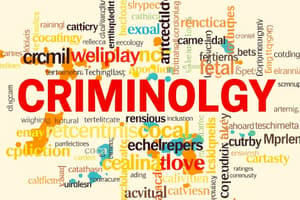Podcast
Questions and Answers
What are the key characteristics of legal language that differentiate it from everyday language?
What are the key characteristics of legal language that differentiate it from everyday language?
Key characteristics include technical terminology, impersonal constructions, long and complex sentences, and legal jargon.
In what ways is legal language being reformed to improve communication with the public?
In what ways is legal language being reformed to improve communication with the public?
Legal language is being reformed to be clearer and more accessible, minimizing jargon and using straightforward language.
How does the Plain Legal Language movement contribute to the drafting of legal documents?
How does the Plain Legal Language movement contribute to the drafting of legal documents?
The Plain Legal Language movement advocates for clear and simple language in legal drafting to improve transparency and comprehension.
Why is precision in legal language essential, and how does it affect communication effectiveness?
Why is precision in legal language essential, and how does it affect communication effectiveness?
What role does linguistic analysis play in the interpretation of legislation according to the debate between lawyers and linguists?
What role does linguistic analysis play in the interpretation of legislation according to the debate between lawyers and linguists?
How has the shift from speech to writing influenced legal communication?
How has the shift from speech to writing influenced legal communication?
What are the implications of legal technicality for everyday communication?
What are the implications of legal technicality for everyday communication?
How do judges facilitate communication between written law and jurors?
How do judges facilitate communication between written law and jurors?
What role does Latin and French play in the vocabulary of the law?
What role does Latin and French play in the vocabulary of the law?
In what ways does the grammar of legal language reflect the complexity of legal concepts?
In what ways does the grammar of legal language reflect the complexity of legal concepts?
Why is a specialized legal lexicon necessary in legal practice?
Why is a specialized legal lexicon necessary in legal practice?
Discuss the importance of communication effectiveness in legal contexts.
Discuss the importance of communication effectiveness in legal contexts.
What are the characteristics of microcultures within legal practice?
What are the characteristics of microcultures within legal practice?
What are the three levels of the linguistic system used in legal communication?
What are the three levels of the linguistic system used in legal communication?
Why is strong English language proficiency crucial for lawyers?
Why is strong English language proficiency crucial for lawyers?
How does the legal system reflect a society's beliefs and values?
How does the legal system reflect a society's beliefs and values?
What is meant by 'register' in the context of legal language?
What is meant by 'register' in the context of legal language?
How does effective communication in law extend beyond verbal language?
How does effective communication in law extend beyond verbal language?
What are the implications of using specific lexicon and grammar in legal communication?
What are the implications of using specific lexicon and grammar in legal communication?
Can you explain the concept of 'speech acts' in legal communication?
Can you explain the concept of 'speech acts' in legal communication?
What role do applied linguists play in the context of language and law?
What role do applied linguists play in the context of language and law?
Flashcards are hidden until you start studying
Study Notes
Legal Language and Its Features
- The law in literate societies is a written social institution, associated with the deployment of power and societal norms.
- The language of the law exhibits a shift from speech to writing, specialization and technicality, and the use of power.
- Legal writing has transitioned from spoken legal texts to written forms and has returned to more oral forms through video recording and photography, reflecting a cultural change from aurality to visuality.
- Judges sometimes translate legal language from written to spoken form for jurors.
- Legal language is characterized by extensive technicality, including specialized vocabulary like "codicil," "deforcement," and "decree nisi."
- Everyday words are often used in a specialized legal context, such as "contempt," "execution (of a document)," "caution," and "costs."
- Latin and French have significantly influenced legal language, contributing terms like "habeas corpus" and "tort."
- The grammar of legal language utilizes long noun phrases to convey complex and precise meanings and intricate syntactic structures to establish the nature and application of laws.
- The legal system has a unique perspective on reality, with legal practice forming a distinct microculture, making technical legal language essential for expressing legal notions and processes.
- Legal technicality is found in various languages and legal systems, like Spanish and Catalan.
- Linguistics plays a crucial role in drafting, interpreting, and implementing law in areas of semantics and hermeneutics.
- The Plain Legal Language movement aims to make legal language more accessible.
- There is a significant debate among lawyers and linguists regarding the role of linguistic approaches in interpreting and implementing legislation.
The Interface of Language and Law
- The interface of law and language encompasses the use of language within the legal system and the use of linguistic evidence in legal proceedings.
- Some argue that language is essential to law, as legal notions are primarily expressed through language.
- Strong English skills are crucial for lawyers to write legal documents, negotiate agreements, and present arguments in court.
- Law relies heavily on language, although it's not solely a linguistic institution.
- The legal system reflects society's values and beliefs and permeates everyday life.
- The language of law is particularly important for applied linguists.
- The interaction of language and law is also studied in fields such as literature, communication, philosophy, legal studies, and psychology.
Legal Communication
- Legal communication includes non-verbal elements like gestures and illustrations, and verbal elements, primarily categorized into three systems: - The grapho-phonic system: Includes the font used in legal documents and the pace and intonation of a courtroom speech. - The lexico-grammatical system: Encompasses words, morphology (word formation), and syntax (sentence structure). - The discourse system: Refers to genres within legal communication.
- Legal registers are recognized by their specific and unique lexico-grammatical patterns used in legal contexts.
- Legal language negotiates different types of meaning: propositional meaning, social meaning, and functional meaning (speech acts).
Studying That Suits You
Use AI to generate personalized quizzes and flashcards to suit your learning preferences.




